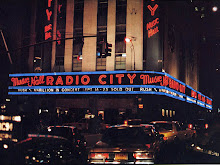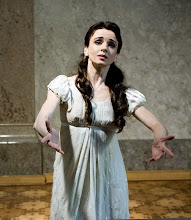 I usually catch two or three acts every year, depending on who's coming through. There have been some magical moments (in the case of acts like Jason Moran, Matthew Shipp and Bobby Hutcherson), and one questionable one too (if you look through posts from last fall, you can read about the John Zorn fiasco).
I usually catch two or three acts every year, depending on who's coming through. There have been some magical moments (in the case of acts like Jason Moran, Matthew Shipp and Bobby Hutcherson), and one questionable one too (if you look through posts from last fall, you can read about the John Zorn fiasco). The most memorable event came during the 2006 festival, when pianist Andrew Hill came through town. The album covers shown throughout this post are his most recommended works.
At the Showbox in Seattle, we arrived early and grabbed a seat at the front of the stage...I wasn't going to sit in the back to watch my favorite jazz artist. On stage right (performer's perspective) sat a large Steinway piano, and a drumset adorned the middle of the stage.
A face soon peaked out from the behind the stage left curtain. Andrew Hill emerged, walking very, very slowly. It was obvious that something was off, but it was hard to place what was happening with him.
 The drummer and bass player came out after Hill found his seat at the piano. For nearly 45 minutes, the band went through a set of new and old material, the latest of which came from an album released earlier that same year, Time Lines. Between every song, he would announce the titles, although he was very difficult to hear since he was speaking in a low whisper. The thanked the audience for being there.
The drummer and bass player came out after Hill found his seat at the piano. For nearly 45 minutes, the band went through a set of new and old material, the latest of which came from an album released earlier that same year, Time Lines. Between every song, he would announce the titles, although he was very difficult to hear since he was speaking in a low whisper. The thanked the audience for being there.Hill was in top form throughout the set...the ethereal sounds emerging from his fingers emitted a sort of magic...sounds audible on his records, which I'd collected over the last few years to my CD collection, but not quite the same as in the flesh.
While the set seemed a bit short, it was definitely not short on quality. One of the things I love about Hill's music is the way he can fly into a protracted off-the-wall jam session, but then bring things down into a light groove that bounces across the stage like a feather. His style is full of complexity and mystery.
 After Andrew Hill left the stage and the performance ended, little did I know that at approximately 70 years young he was dying of lung cancer and playing through shortness of breath and unimaginable suffering.
After Andrew Hill left the stage and the performance ended, little did I know that at approximately 70 years young he was dying of lung cancer and playing through shortness of breath and unimaginable suffering. He died in 2007, less than six months after the performance I attended. Once again, I had been blessed with the opportunity to see a legend live right before their passing. I'd had the same opportunity in 1994 when I saw the Grateful Dead right before Jerry Garcia passed away the following year...except Garcia wasn't suffering from a terminal illness.
What Hill pulled off was nothing short of miraculous. That guy had indescribable determination, along with tons and tons of guts...forget that the performance was as close to perfection as one could have it...anyone listening that night who didn't know about Hill's cancer or couldn't see how he was struggling to get across the stage would have thought that he was perfectly fine. What a stud.
That's the stuff of legend...and that's exactly what Andrew Hill is.
Here's a biographical overview from Amazon.com:
 Andrew Hill was a great and even groundbreaking composer and pianist, yet the relatively circumscribed scale of his innovations might have originally caused him to get lost in the shuffle of the '60s free jazz revolution.
Andrew Hill was a great and even groundbreaking composer and pianist, yet the relatively circumscribed scale of his innovations might have originally caused him to get lost in the shuffle of the '60s free jazz revolution. While many of his contemporaries were totally jettisoning the rhythmic and harmonic techniques of bop and hard bop, Hill worked to extend their possibilities; his was a revolution from within. Much of the most compelling '60s jazz was nearly aleatoric; Hill, on the other hand, exhibited a determined command of his materials, however abstract they might sometimes be.
His composed melodies were labyrinthine, and rhythmically and harmonically complex tunes like "New Monastery" from his Point of Departure album exhibit a sophistication born of mastery, not chance or contingency. As a pianist, Hill had a flowing melodicism and an elastic sense of time. Like his composing, Hill's playing had an ever-present air of spontaneity and was almost completely devoid of cliché.
He began playing the piano at about the age of 13. As a youngster in Chicago, Hill was encouraged by pianist Earl Hines. Jazz composer Bill Russo also took an interest, and introduced Hill to the renowned classical composer Paul Hindemith, with whom Hill studied from 1950-1952.
 While in his teens, he gigged with prominent jazz musicians passing through the Midwest, Miles Davis and Charlie Parker among them. In 1955, he recorded So in Love with the Sound of Andrew Hill for the Warwick label. He moved to New York in 1961 to work with singer Dinah Washington. After a brief foray to Los Angeles with Rahsaan Roland Kirk's band in 1962, Hill moved back to New York, where he began his recording career in earnest.
While in his teens, he gigged with prominent jazz musicians passing through the Midwest, Miles Davis and Charlie Parker among them. In 1955, he recorded So in Love with the Sound of Andrew Hill for the Warwick label. He moved to New York in 1961 to work with singer Dinah Washington. After a brief foray to Los Angeles with Rahsaan Roland Kirk's band in 1962, Hill moved back to New York, where he began his recording career in earnest.He made several records for Blue Note from 1963-1969, both as leader and sideman. Hill's Blue Note work featured some of the best and brightest post-bop musicians of the day, including Eric Dolphy, Joe Henderson, Woody Shaw, Tony Williams, and Freddie Hubbard.
Like many jazz musicians, Hill eventually turned to academia to make a living. He received his doctorate from Colgate University and served as the school's composer in residence from 1970-1972. Hill relocated to the West Coast, teaching in public schools and prisons in California. He eventually landed a teaching position at Portland State University, where he established the school's Summer Jazz Intensive.
In addition to his teaching, Hill continued to perform and record in the '70s and '80s, making records for the Arista-Freedom and Black Saint/Soul Note labels. In 1989 and 1990, Hill recorded twice more for Blue Note, Eternal Spirit and But Not Farewell.
 Hill moved back to the New York area in the '90s; a series of performances and new recordings helped place him back in the jazz spotlight. Hill formed a new Point of Departure Sextet for the Knitting Factory's 1998 Texaco Jazz Festival. The band included saxophonists Marty Ehrlich and Greg Tardy, trumpeter Ron Horton, bassist Scott Colley, and drummer Billy Drummond. The band went on to play New York club engagements to much acclaim.
Hill moved back to the New York area in the '90s; a series of performances and new recordings helped place him back in the jazz spotlight. Hill formed a new Point of Departure Sextet for the Knitting Factory's 1998 Texaco Jazz Festival. The band included saxophonists Marty Ehrlich and Greg Tardy, trumpeter Ron Horton, bassist Scott Colley, and drummer Billy Drummond. The band went on to play New York club engagements to much acclaim. In 2000, Palmetto Records released Dusk, which was named the best album of 2001 by Down Beat and Jazz Times magazines. It was followed by A Beautiful Day in 2002, Passing Ships in 2003, and Black Fire in 2004, as well as a solid series of Blue Note reissues of his '60s work that included bonus tracks and new liner notes. His 2006 album, Time Lines, reunited him with both trumpeter Charles Tolliver and the Blue Note label. Hill also participated in a 17-piece big band, and a January 2002 engagement at New York's Birdland was filmed and recorded by Palmetto for future broadcast.
After battling lung cancer for many years, Hill succumbed to the disease on April 20, 2007, leaving behind a stunning legacy of work.
~ Chris Kelsey, All Music Guide






















No comments:
Post a Comment